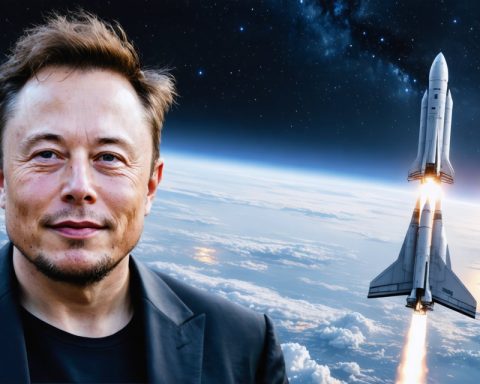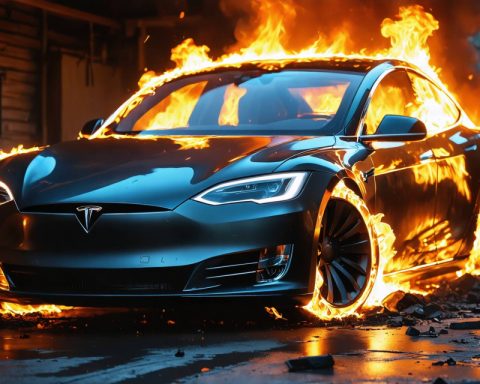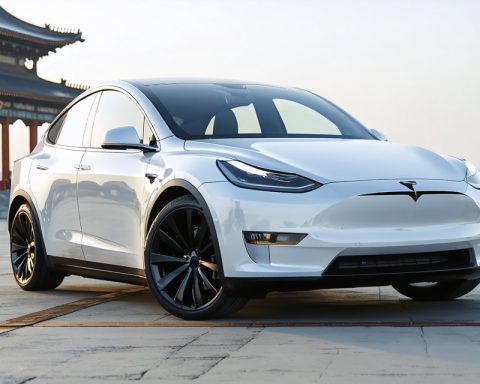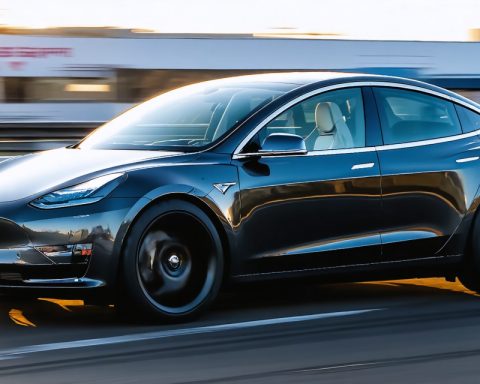- Tesla’s shares fell 15% since January due to slowing EV sales and Elon Musk’s political engagement.
- Musk’s endorsement of Trump initially spurred investor optimism, boosting stock prices.
- The “Department of Government Efficiency,” led by Musk, raises concerns about his divided focus.
- Musk’s history as a polymath entrepreneur suggests he can manage multiple ventures like SpaceX without neglecting Tesla.
- Despite the stock dip, Tesla’s foundation remains strong, with future prospects in autonomous tech and AI.
- The current dip might offer a strategic investment opportunity for long-term investors.
The close of 2024 painted Tesla in radiant success, with stock prices reaching unprecedented heights amid a backdrop of optimism and political ties. But as the new year emerges, Tesla’s trajectory has taken a turn, with its shares sliding 15% since the January earnings report. At first glance, slowing electric vehicle sales might seem to be the culprit. Yet, there’s a more nuanced narrative unfolding, one involving Elon Musk’s burgeoning political engagement.
In the wake of Donald Trump’s presidential win, a fervor of anticipation enveloped investors, bolstered by Musk’s endorsement of the then-candidate. This enthusiasm quickly translated into stock market gains, buoyed by hopes that Musk’s relationship with Trump would smooth regulatory paths for Tesla’s pioneering ventures. However, January’s waning investor confidence reveals a skepticism towards Musk’s shifting focus.
Currently spearheading the Department of Government Efficiency—a group newly crafted by Trump to refine federal spending—Musk appears entangled in the political arena. His frequent Washington presence has sparked concerns among investors questioning whether Tesla’s charismatic leader is spreading himself too thin.
Critics suggest Musk’s White House endeavors could dilute his attention from Tesla. However, such concerns might overlook a crucial aspect: Musk’s intrinsic nature as a polymath entrepreneur. Leading multiple high-stakes ventures like SpaceX and Neuralink, Musk thrives amidst complexity, balancing diverse ventures without skipping a beat at Tesla.
The sell-off confounds more than it illuminates, masking Tesla’s robust fundamentals and shrouding Musk’s ambitious long-term vision, which extends far beyond mere vehicular innovation. Despite present hurdles, the fusion of autonomous tech and AI within Tesla beckons a promising future. For those viewing the market through a long-term lens, Tesla’s current price dip presents a compelling opportunity to invest in this unconventional tech powerhouse.
Tesla’s Tumultuous Turn: What the Recent Stock Slide Means for Investors
How-To Steps & Life Hacks
Investing Amidst Volatility:
1. Research Thoroughly: Before investing in companies experiencing volatility, review financial reports, market trends, and expert analyses. Look at Tesla’s quarterly earnings, production forecasts, and the strategic moves of key leadership figures.
2. Diversify Portfolio: Don’t put all your eggs in one basket. Consider balancing Tesla stocks with other stable investments or ETFs focused on green energy or tech.
3. Stay Informed: Set alerts for significant news concerning Tesla and broader market shifts. Use reliable financial news sources like Bloomberg.
Real-World Use Cases
Tesla vehicles are commonly used in personal, corporate fleet, and even ride-sharing scenarios due to their eco-friendly appeal and advanced technological features. Tesla’s Autopilot and Full Self-Driving technologies are pioneering innovations within the autonomous vehicle sector, with potential to revolutionize personal and commercial transport industries.
Market Forecasts & Industry Trends
According to market analysis, the electric vehicle (EV) market, driven by increasing demand for sustainable transportation, is expected to grow from $287 billion in 2021 to over $1.3 trillion by 2028. Tesla, as a leader in this domain, stands to benefit significantly as regulatory frameworks and consumer preferences shift toward electrification globally.
Reviews & Comparisons
Tesla stands out for its cutting-edge technology, particularly in battery efficiency and autonomous driving capabilities. However, competitors like Rivian, Lucid Motors, and traditional automakers such as Ford and GM have made significant strides, increasing competition.
Controversies & Limitations
The main controversy surrounding Tesla stems from CEO Elon Musk’s political entanglements, which can overshadow company objectives. Critics argue that Musk’s engagement in politics could distract from Tesla’s mission. Additionally, production delays, quality control, and regulatory compliance remain recurring challenges.
Features, Specs & Pricing
Tesla’s Model 3, Model Y, and new iterations of Model S and X offer advanced features like enhanced Autopilot, long-range battery, and energy-efficient designs. Pricing starts around $40,000 for the Model 3, making it one of the more affordable luxury EVs on the market.
Security & Sustainability
Tesla’s vehicles incorporate robust cybersecurity measures, but like all connected devices, they require regular updates to mitigate vulnerabilities. Sustainability is central to Tesla, as evidenced by their push for renewable energy solutions, such as Solar Roof and Powerwall.
Insights & Predictions
Tesla’s expansion into energy products and AI signifies a broader vision beyond automotive, aiming to be a leader in global sustainable energy solutions. Analysts predict Tesla is positioned to capitalize on these markets, potentially transforming energy consumption and distribution.
Tutorials & Compatibility
Future updates to Tesla’s software could include expanded compatibility with third-party applications, enhancing infotainment and autonomous capabilities. Owners are encouraged to stay updated with Tesla tutorials available through their website and app for maximizing vehicle features.
Pros & Cons Overview
Pros:
– Industry-leading innovation
– Strong brand recognition
– Potential upside from diversification into energy solutions
Cons:
– Controversial leadership influences
– High competition in EV space
– Production and quality control issues
Actionable Recommendations
– Long-Term Perspective: Focus on Tesla’s fundamentals and growth potential in the EV and energy sectors.
– Engage with Community: Join forums and groups dedicated to Tesla stock to share insights and stay informed.
– Financial Advising: Consult with a financial advisor to tailor investment strategies that align with personal financial goals.
In summary, Tesla’s fluctuations represent both risks and opportunities. Investors should weigh Tesla’s innovative prowess against market competition and the external challenges posed by Musk’s political engagements. For those with a long-term outlook, Tesla remains a compelling, albeit volatile, investment.


















